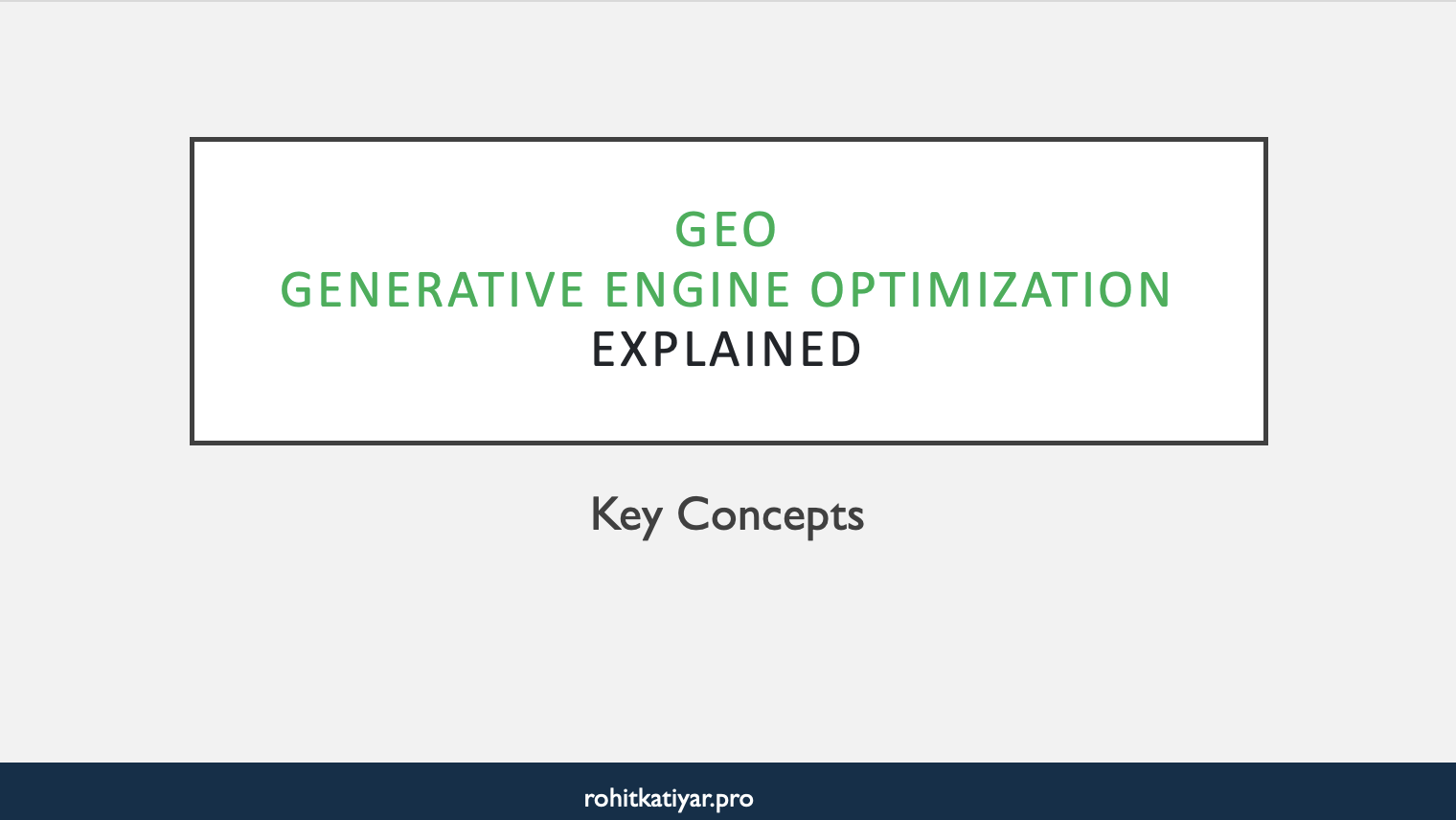Key Takeaways
- GEO is essential for AI-driven brand discoverability.
- Structured data and digital authority are key drivers.
- Prompt engineering and AI monitoring give marketers an edge.
- GEO strategies differ fundamentally from traditional SEO.
- Early adopters gain a significant competitive advantage.
Join 473+ Founders & Marketing Leaders for tips, strategies, and resources to scale your business.
Understanding GEO: The New Frontier
What is GEO (Generative Engine Optimization)?
GEO is the process of tailoring content, data structures, and digital signals so that generative engines (such as ChatGPT, Google SGE, Bing Copilot, and others) can find, interpret, and use your information accurately in their synthesized answers.
“If SEO is about links and rankings, GEO is about context and credibility in the eyes of AI.”
Why GEO Matters in 2025
- Generative engines are now the default for billions of queries.
- AI-driven answers are replacing traditional search listings.
- Brands not optimized for generative engines risk invisibility.
How GEO Differs from SEO
- GEO optimizes for answer engines—not just search engines.
- Focuses on structured data, reputation signals, and prompt context.
- Rewards depth, accuracy, and authority over keyword stuffing.
Did you know?
GEO requires a mindset shift: What matters is how AI understands and utilizes your content—not just how humans read it.
The Mechanics of GEO: How Generative Engines Work
How Generative Engines Find Content
Generative engines crawl and ingest vast amounts of web data, third-party databases, and proprietary sources. They use this data to train large language models (LLMs) capable of creating synthesized, context-aware responses.
- LLMs rely on context, not just keywords.
- Entities, relationships, and structured data are crucial.
- Brand mentions and citations influence response quality.
“Your brand’s digital footprint is now a training set for AI engines.”
The Role of Structured Data & Entities
- Schema markup, knowledge graphs, and entity-based SEO drive better AI understanding.
- Structured data helps LLMs link your brand to relevant topics and attributes.
- Consistent, accurate profiles across the web reinforce trust.
Reputation, Citations & Trust Signals
- Generative engines value citations, reputable sources, and clear authorship.
- Backlinks matter less than brand mentions and expert recognition.
- Positive reviews, media coverage, and awards serve as trust signals.
Pro Tip:
Invest in building digital authority and structured data—these are the new backlinks in GEO.
GEO Strategies: Tactics for Founders & Marketers
Content Optimization for Generative Answers
- Create in-depth, well-structured content that answers core user intents.
- Use clear, concise language and anticipate related questions.
- Update content regularly to ensure freshness.
Harnessing Structured Data & Knowledge Graphs
- Implement schema markup for products, people, organizations, and FAQs.
- Claim and optimize knowledge panels on Google, Bing, and relevant platforms.
- Build and update your brand’s presence on Wikidata, LinkedIn, Crunchbase, and industry directories.
“Structured data is your direct line to AI understanding—don’t leave it to chance.”
Building Brand Authority for AI Engines
- Secure expert citations and third-party endorsements.
- Encourage media mentions and interviews.
- Showcase client testimonials, awards, and certifications.
Prompt Engineering for Brand Representation
- Analyze how generative engines respond to prompts about your brand or industry.
- Optimize content to influence how LLMs answer key questions.
- Develop company-specific prompt libraries for internal and external use.
Did you know?
Prompt engineering isn’t just for developers—marketers can shape how AI answers by optimizing their digital signals.
Monitoring & Measuring GEO Success
- Track brand mentions in generative answers using AI monitoring tools.
- Analyze visibility in AI search results and answer engines.
- Adjust strategies based on engine updates and emerging trends.
Implementing GEO: Tools, Tips & Best Practices
Essential GEO Tools & Platforms
- Structured Data Testing Tools (Google, Bing)
- AI Monitoring Platforms (e.g., Jasper, MarketMuse, SurferSEO)
- Knowledge Graph Management (Yext, Schema.org)
- Brand Mention Trackers (Brand24, Mention)
“Optimizing for GEO is an ongoing process—automate wherever possible.”
Best Practices for GEO Optimization
- Keep digital profiles consistent across platforms.
- Regularly audit and update structured data.
- Foster relationships with industry experts and media.
- Use clear, unambiguous language in all content.
- Diversify formats: text, video, audio, and structured snippets.
Common GEO Pitfalls (and How to Avoid Them)
- Ignoring structured data or knowledge panels.
- Relying solely on keyword-driven SEO.
- Overlooking the importance of digital reputation.
- Neglecting AI monitoring and prompt testing.
Pro Tip:
GEO is not a one-time project—make it part of your ongoing marketing operations.
Future-Proofing Your Brand: GEO in Action
The Evolving Landscape of Generative AI
- Generative engines are rapidly improving their ability to synthesize and personalize answers.
- The boundary between search, chat, and personal assistant is blurring.
- AI-driven content curation and recommendation will soon outpace manual search.
“Today’s GEO strategies are tomorrow’s table stakes for digital visibility.”
Case Studies: GEO Success Stories
- SaaS companies optimizing product FAQs to appear in generative answers.
- DTC brands leveraging structured data to secure knowledge panels and AI citations.
- Thought leaders shaping AI narratives through expert-authored content and interviews.
Preparing Your Team for GEO
- Upskill teams in structured data, prompt engineering, and AI monitoring.
- Foster a culture of experimentation and adaptation.
- Allocate resources for ongoing GEO efforts.
Did you know?
Early GEO adopters consistently report higher brand visibility and trust in AI-driven results.

FAQ: GEO (Generative Engine Optimization)
What is GEO and how does it differ from SEO?
GEO optimizes digital assets for generative AI engines, focusing on structured data and authority, not just keyword rankings.
Why is GEO important now?
Generative engines are quickly becoming the primary way users discover information—brands must adapt or risk irrelevance.
Which tools help with GEO?
Structured data testing, AI monitoring platforms, and brand mention trackers are essential for effective GEO.
How can founders and marketers get started with GEO?
Begin by auditing structured data, optimizing digital profiles, and monitoring how your brand appears in generative answers.
How do I measure GEO ROI?
Track visibility in generative answers, brand mentions, and AI search rankings—not just website traffic.
You may also like the below Video Course

Conclusion: Take Action on GEO
GEO isn’t a fad—it’s the next step in digital marketing evolution. Founders and marketing leaders who invest in GEO now will future-proof their brands, secure AI-driven visibility, and build lasting trust with audiences.
- Audit your digital footprint for GEO readiness.
- Invest in structured data and AI monitoring.
- Foster brand authority and expert recognition.
- Treat GEO as an ongoing, adaptive process.
Want to Scale your SEO initiatives?
Need a SEO growth partner who can build the same automation, paid acquisition, and retention systems we architect for our marketing automation and growth retainers? We help leaders scale repeatable revenue engines in SEO without adding bloated headcount.
Talk to us about plugging our expert team into your roadmap—no pressure, just a candid conversation about how we can automate, optimize, and grow faster together.


